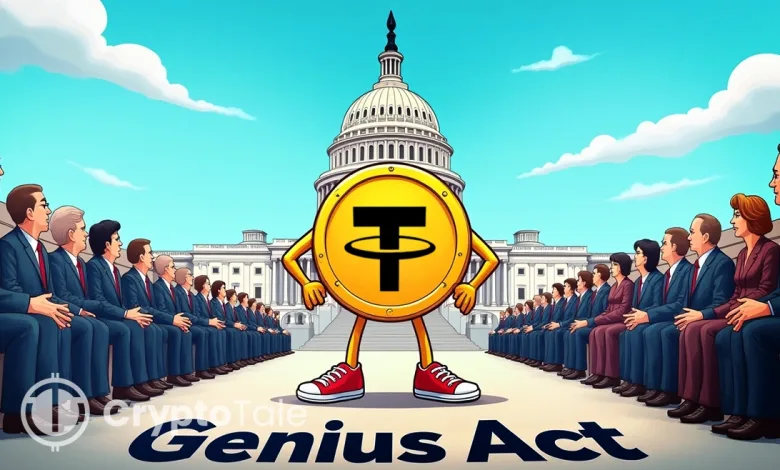GENIUS Act Threatens Tether With U.S. Ban Over Reserves

- The GENIUS Act could force Tether to disclose full reserves or exit U.S. markets entirely.
- New rules ban stablecoins backed by offshore assets and empower U.S. regulators to enforce.
- If Tether fails to comply, USDT could depeg, disrupting crypto liquidity and trading pairs.
The GENIUS Act has passed the U.S. Senate, earning praise from President Donald Trump as a major breakthrough. Trump called it “pure GENIUS,” urging the House to pass it quickly without changes. The bill targets stablecoin transparency, foreign reserve holdings, and offshore issuers.
If passed into law, the act could pose a major threat to stablecoins like Tether (USDT). It would require issuers to disclose all reserve details, including foreign assets, counterparties, and debt. U.S. regulators would also gain enforcement power over stablecoins that do not comply with regulations.
Tether has long been criticized over the quality and clarity of its reserves. Critics have often raised concerns about the offshore nature of its backing. According to the new regulations, Tether may be required to provide real-time, audited information about its reserves.
The act also bans stablecoins backed by opaque or high-risk offshore assets. This regulation may directly impact Tether’s business model, which is based on foreign settlements. If Tether cannot comply with the new regulations, U.S. exchanges and banks may cease to support USDT.
This might lead to significant trade complications and market instability. Currently, Tether is the most used stablecoin by volume in the global market. The loss of support in the U.S can lead to panic and redemption pressure in the world.
Experts warn that redemption queues and frozen withdrawals could follow. Arbitrage would break down, and liquidity would dry up across markets. This may cause temporary depegging of USDT and steep drops in altcoin prices. DeFi platforms that rely on USDT may suffer rapid liquidations. The crypto markets may experience the violent unwinding of leverage, including even Bitcoin.
Related: U.S. Senate Approves GENIUS Act for Stablecoin Regulation
Regulated alternatives like USDC, FDUSD, and PYUSD would likely gain market share. These stablecoins follow strict compliance rules and could fill the gap left by Tether. U.S. regulators and traditional banks would benefit from greater control and transparency.
Tether’s CEO, Paolo Ardoino, has hinted at launching a separate U.S.-regulated coin. This move could help the company remain active in U.S. markets under new laws. Still, full GENIUS Act compliance may be too costly or risky for Tether’s current model. The crypto sector now waits to see if the House will pass the bill. If it does, the landscape of stablecoins may change forever.




